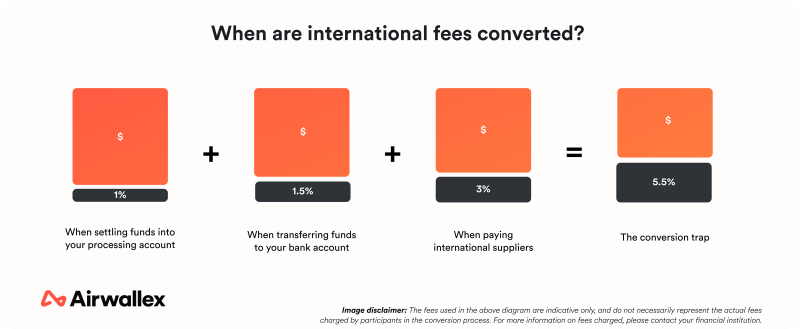Why accepting payments smarter matters more than ever before

Turning uncertainty into opportunity
Economic uncertainty, at home and across the globe, typically changes how businesses approach the market. From monitoring the economic environment, companies often hold off on hiring and attempt to streamline costs.
As instability lingers, businesses should look at smart solutions to keep more of their margin and partner with the right solution that will support their long-term growth.
Get smart in the payment game
Adversity is not a new experience for most businesses, and combined with added economic uncertainty, higher borrowing costs, and drops in consumer spending, the agenda has shifted from a focus on growth to a focus on maintenance.
According to a recent retail report, consumers are making conscious changes to their spending habits in order to save money. This matches our recent Digital Economy Index for Q2 2023, which also highlights a decrease in online spending. These adjustments reflect the prioritization of essential expenses and the redirection of funds towards savings goals.
Much of the business focus concentrates on defensive strategies like cost-cutting and hiring freezes and although this will be able to help businesses tide over in the short term, companies will eventually have to make longer-term cost savings.
Get smart and save costs in the long run
Getting smarter means finding out just how much you may be spending on avoiding unnecessary and hidden fees, keeping more of your hard-earned margin, and using tools to provide you with the right platform to grow. Many businesses may be unaware that the perceived "business as usual" process significantly eats into your margin with every payment you just receive and make in foreign exchange.
Every international dollar a business generates may be converted up to three times. And the fees incurred when this happens, aren’t always necessary - in other words, businesses can avoid them. When a business is stuck paying unnecessary fees, we call this the conversion trap, and for many companies, it’s hard to escape. But, how can companies avoid this trap? Let’s dive deeper to understand this better.

1. Accepting payments from customers
The first fee occurs when you accept payments from your customers through your payment service provider (PSP). Acting as a mediator between you and your customer's bank, the PSP charges a processing fee for facilitating the transaction. This could be a fixed cost per transaction or a small percentage of the transaction cost, or both depending on the payment method.
In addition, if your customers pay in their own local currency, you may be forced to pay more fees to process these funds. For example, if you’re a US business pricing in AUD, you may be forced to settle this payment in USD from your PSP. This will incur conversion fees. If then, you go to pay your supplier or vendor in AUD, you’ll need to convert the funds back from USD to AUD again - incurring yet another forced conversion fee.
2. Settling payments collected from customers
The second fee businesses may incur is a forced FX fee when you transfer funds to your business bank account. For instance, you may have settled in multiple foreign currencies, but you may not have a local bank account to hold each of those foreign currencies. As a result, funds are converted each time you transfer them to your primary bank account.
3. Paying international suppliers and vendors
The third fee comes when paying international suppliers. Although you may have a local bank account in USD, you might spend globally. For example, you may pay for digital ads in USD, pay suppliers in CNY, or use a service based in a different geographical location.
This is the ‘conversion trap’. While it is hard to avoid, it's not impossible. With the right partner, you can save costs just by doing business as usual. Take leading luggage brand July, for instance, who are saving 10% on their transfer fees and up to 50% on time spent on financial admin.
Reviewing your financial practices now may be a key strategy to set you up for the next financial year.
More than a global issue
As many US businesses look to hold off on going global in this economic climate, we’ve found that a huge portion of businesses that define themselves as domestic still settle, pay, and accept payments in foreign currencies each and every day.
You may not service a global market directly, but undoubtedly most businesses at some point in time, process international currencies.
Put simply, there are forced FX and/or fees each time you accept a payment, forced FX and/or fees each time you settle money into your bank account, and forced FX or fees each time you spend. That’s a lot of force.
The impact of foreign currencies on the bottom line, whether you’re a domestic or global business, is clear.

Not settling for ordinary
Accepting payments with our market-leading business rates of 2.8% + 30c matters more now than ever before. With the right products, businesses can avoid the conversion trap, just by revising their traditional financial practices.
Our solutions are simple and effective:
Forced FX or fees each time you accept payments from your customers through your payment service provider? No problem, there are 10+ currencies available for like-for-like settlement with Airwallex. Accept money at just 2.8% + 30c for domestic cards, or at 4.3% + 30c for international cards.
Forced FX each time you transfer funds to your bank account? We provide multiple global accounts covering 60+ countries and 20+ currencies, all accessible from within our smart platform. Less admin, less fees and more control - now that’s smart.
Forced FX each time you spend? No need, spend directly from your multi-currency wallet via cards or transfers using local rails.
Don’t settle for ordinary this financial year.
Case study: July luggage consistently achieves at least 10% savings in transfer fees
We spoke with Richard Li, July's Co-Founder and CEO, on why July has chosen Airwallex as their long-term global financial partner and how Airwallex Payments Solutions are just the tip of the iceberg in their seamless global finance processes.
“We have contractors based in China, the US and Europe, and our Airwallex Global Account enables us to make global payments from one simple portal.
“When dealing with international currencies, you can lose a lot of money with exchange rates and settlement fees. Given our upcoming launch in the UK, we’re now chatting with the Airwallex team about receiving money in GBP.”
“We pay our suppliers mostly in USD, and it’s fantastic being able to receive USD and then pay our suppliers directly from that account, without having to expose those funds to fluctuating rates. It’s saving us a big amount of money.”
Airwallex’s Payment Link product is also a great way for July to provide excellent customer service to their corporate clients. Instead of having them pay through Shopify, they can just send them a quick and easy link for the required amount that allows them to be paid instantly.
Put Airwallex to the test. Try us for free.
Share
View this article in another region:AustraliaCanada - EnglishCanada - undefined
Related Posts

Why more OTAs are becoming merchants of record in 2025
•6 minutes

When should (or shouldn’t) your business be in the flow of funds?
•6 minutes
